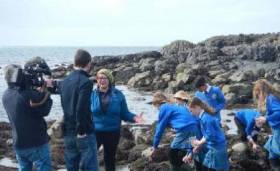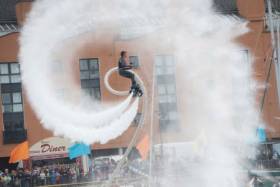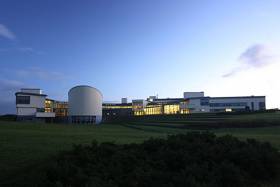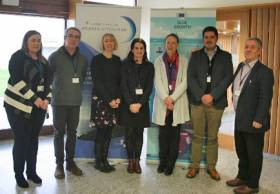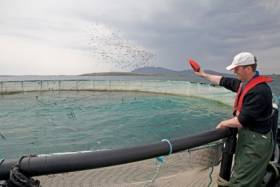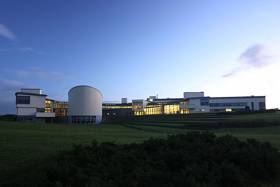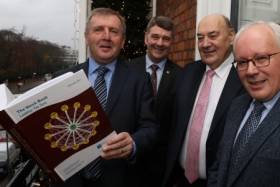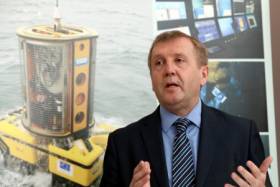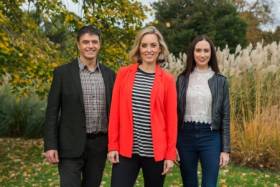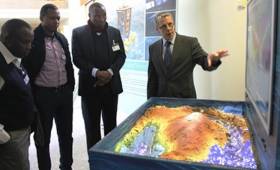Displaying items by tag: Marine Institute
2017 a Successful Year of Increasing Ocean Literacy in Irish Primary Schools
#MarineScience - Delivered by ten centres around Ireland is The Explorers Education Programme, that met up to 15,000 primary school students, worked with over 500 school teachers and trained in excess of 100 teachers and student teachers on the east and west coasts.
In addition the Programme generated attendance from several public events reaching over 300,000 people throughout the country in 2017.
Dr Peter Heffernan, CEO, Marine Institute congratulated the centres representing the Explorers Education Programme on their delivery and supporting the Governments national marine strategy Harnessing Our Ocean Wealth, "where one of its goals is to increase Ireland's engagement with the sea. A wave of ocean literacy has hit our shores this year, and it has been incredible to see the Explorers programme go from strength to strength over the last ten years from where we started with ten schools and now are reaching 500 around the country this year. The positive feedback from the teachers and their wider communities about student's eagerness to learn about the ocean reinforces the importance of reaching out to primary schools to help build our marine science capital."
As part of the Explorers Programme interactive marine based modules are introduced in classes that include aquariums in the class, seashore safari's, and a range of marine based projects learning about marine biodiversity, marine environmental awareness and care, marine history as well as marine technology. "Over the last year we have worked with teachers assessing the level of awareness, engagement, and ocean literacy in the classroom and have seen a significant increase in the student's knowledge about the ocean around them," explained Cushla Dromgool-Regan at the Marine Institute.
"The Explorer centres midyear results showed an increase from 59% to 85% in primary school children's knowledge about the ocean nationally, which was amazing, and is a great reflection on the team of outreach officers who are visiting the schools. We are very proud to have supported the Explorers outreach centres around the country who have reached a record number of participants this year" added Cushla Dromgool-Regan.
The Explorers Education Programme aims to help promote learning and increasing our knowledge about the ocean in our communities. "At a national level the Explorers Education Programme has been recognised by teachers and schools as delivering a programme of high impact where students learn about ocean through cross curricular activities ranging from the arts to the sciences. Often the Explorer programme brings out new ideas and team work amongst the students that teachers also get inspiration from," explained Dr Noirin Burke, Galway Atlantaquaria.
The Explorers modules and resources are used to support teachers in achieving their curriculum objectives and can also help schools develop strategies for teaching sustainability topics and hands-on inquiry based lessons which are inclusive of all students needs in the classroom " Dr Noirin Burke further added.
The Explorers Education Programme is supported by the Marine Institute, and is funded under the Marine Research Programme by the Irish Government and is available for schools to take part in throughout a number of coastal counties in Ireland. For more information please visit www.explorers.ie
Returning to Galway - Fun, Family Friendly Events at SeaFest 2018
#Seafest2018 - Returning to Galway in 2018 will be Seafest, Ireland's biggest and most spectacular maritime festival.
For three days SeaFest 2018 take place from from 29th June to 1st July – a weekend of fun, family friendly events not to be missed.
More than 100,000 visitors flocked to Galway Harbour to enjoy a host of activities and entertainment on and around the water for SeaFest 2017. World Champion Flyboarders performed breath-taking aerial acrobatics in the heart of Galway's ship-filled harbour. There were open tours of the tall ship The Phoenix, Irish naval vessel LÉ Ciara, and the Marine Institute's research vessel RV Celtic Explorer. Visitors also took to the water and gave kayaking and sailing a go with the Irish Sailing Association offering disabled access to budding sailors.
BIM and Bord Bia hosted a showcase of Irish seafood with live cookery and fishmongery demonstrations, as well as interactive exhibits and displays of live fish and shellfish species. A huge display from the Defence Forces was popular with the young and the young at heart. The LookWest.ie Marquee hosted talks from marine-inspired entrepreneurs based in the West of Ireland.
The dedicated Kids Zone kept little hands busy with art and craft workshops, storytelling sessions and face-painting. The festival programme also included the interactive gallery, The Wild Atlantic – Sea Science, at Galway City Museum and an exhibition on polar explorer Roald Amundsen at NUI Galway.
SeaFest deepens our knowledge and appreciation of the ocean, celebrates our maritime heritage and also generates awareness about Ireland's abundant marine resources.
SeaFest 2018 will aim to build on the entertaining and educational experiences offered at this year's festival.
SeaFest is coordinated by the Marine Institute, on behalf of the Marine Coordination Group. For more information, follow SeaFest on Facebook and Twitter.
€108,000 Awarded To Early-Stage Marine Researchers
#MarineScience - The Marine Institute awarded €108,000 in grant-aid funding to 94 recipients in 2017 under its Networking & Travel Awards.
This scheme, funded under the Marine Research Programme with the support of the Government, makes awards to provide assistance for networking activities that support the goals of the Harnessing Our Ocean Wealth Strategy.
They also constitute an important part of the implementation of the National Marine Research and Innovation Strategy 2017-2021, which was launched in June this year.
The main focus of the Networking & Travel Awards is to give early-stage researchers, post-graduate students, research assistants and intern staff an opportunity to present their marine research to an international audience, network with international marine experts, and promote research carried out in Ireland on the global stage.
Seventy-seven applicants received travel awards for this purpose. A further nine awards were made in support of hosting marine conferences or workshops in Ireland and for the establishment of international networks for leveraging marine funding.
A final eight awards were for the mobility of research expertise by SMEs for the transfer of knowledge in science and technology towards the development of the marine sector.
Since 2014, 41 participating Irish marine organisations have successfully partnered in 77 marine-related EU projects, bringing a minimum of €29.7 million in EU grant-aid to Ireland.
This represents 7% of the total available drawdown for Ireland for a range of research, development and innovation projects.
Next year’s call for the Marine Institute Networking & Travel Awards will open a month from now in mid-January.
#Horizon2020 - This week’s information day on Horizon 2020 as a key investment driver for the marine sector highlighted the importance of ‘blue growth’ as an important opportunity for marine research in Ireland.
Since 2014, 27 Irish marine participating organisations have successfully partnered in 48 marine-related H2020 projects bringing a minimum of €24.9 million in EU grant aid to Ireland.
This competitive record represents 7% of the total available drawdown for Ireland for a range of research, development and innovation projects, well in excess of the juste retour principle.
The Blue Growth Call aims to sustainably harness the potential of resources from seas, oceans and inland waters for different uses and across the range of marine and maritime industries, while protecting biodiversity and enhancing climate resilience.
It supports sustainable growth in the marine and maritime sectors through a responsible management of marine resources for healthy, productive, safe, secure and resilient seas and oceans, which are essential for thriving ecosystems, climate regulation, global food security, human health, livelihoods and economies.
Speaking at the event hosted by the Marine Institute in Oranmore yesterday (Tuesday 12 December), Fiona Grant of the institute stated that “a strategic co-ordinated approach for marine and maritime research across all parts of Horizon 2020 is required as this will support the implementation of relevant EU policies to help deliver key blue growth objectives across Europe.”
A total of €239 million in dedicated blue growth funding is available between 2018 and 2020 to sustainably harvest the potential of aquatic and marine resources, while protecting biodiversity and enhancing climate resilience.
Funding topics relevant to the marine and maritime sectors can be found under the following non-exclusive and non-exhaustive list of societal challenges across a broad range of blue growth areas in work programmes:
- Food Security, Sustainable Agriculture and Forestry, Marine and Maritime and Inland Water Research and the Bioeconomy and related areas.
- Secure, Clean and Efficient Energy.
- Smart, Green and Integrated Transport.
- Climate Action, Environment, Resource Efficiency and Raw Materials.
- Secure Societies - Protecting Freedom and Security of Europe and its Citizens.
Niall McDonough, director of policy, innovation and research support services at the Marine Institute, highlighted “the value of ongoing cooperation on marine and maritime research.
“Ireland has, in recent years, benefited from national and international partnerships, particularly where there have been coordinated approaches in supporting the EU Atlantic Action Plan. Sharing information, costs, results and best practices, as well as generating ideas for further areas of co-operation in maritime activities, is key to developing a sustainable blue economy in Ireland and the EU.”
The support team for the Atlantic Action Plan provided information relating to Horizon 2020 national contact points, developing a winning proposal, the application process as well as innovation and access to risk finance.
Speakers included Joanne Laffey, support team for the Atlantic Action Plan, Marine Institute; Fiona Grant, H2020 NCP for SC2 (Marine), Marine Institute; Phillip Cheasty, NCP for SC3, Enterprise Ireland; Alice Wemaere, NCP for SC5, Environmental Protection Agency; David Murphy, Aqua TT; Seán Burke, NCP for SME Instrument, Enterprise Ireland; and Julie Clarke, Gavin & Doherty Geosolutions.
Connemara ‘Marine Innovation Park’ Preps New Planning Application
#MarineScience - A new planning application is set to be submitted for the proposed ‘marine innovation park’ in Connemara, as Galway Bay FM reports.
Páirc na Mara is envisaged as a low-carbon marine industry hub over nine hectares, with a focus on aquaculture research.
As previously reported on Afloat.ie, the new research cluster would form part of a network including the existing Marine Institute facilities at Newport in Co Mayo.
The deadline for expressions of interest in the revised project is tomorrow, Friday 1 December.
Galway Bay FM has more on the story HERE.
European Association Of Fish Pathologists To Host Third Meeting In Galway Next September
#MarineScience - Following on from the successful conferences in Keele (2014) and Stirling (2016), the Marine Institute in Galway will host the third meeting of the European Association Of Fish Pathologists (EAFP) on 11-12 September 2018.
‘Connecting academia with industry for improved aquatic animal health’ is the theme of next year’s meeting, which will focus on the latest scientific advances and how this can be applied to the crustacean, molluscan and finfish aquaculture industries to improve the health of such marine wildlife.
The meeting will open with a keynote lecture followed by specific sessions on topics relevant to the UK and Ireland. Early stage researchers (post-graduate students, PhDs) will also get the opportunity to present their work in a dedicated session.
Registration for this event will open in early 2018. More announcements will follow on the EAFP website. For queries contact Dr Neil Ruane at [email protected].
Marine Minister Receives Annual Fish Stock Book
#Fishing - Marine Minister today (Tuesday 28 November) received the Marine Institute’s annual Stock Book for 2017.
The Stock Book, one of the principal annual publications of the Marine Institute, provides the latest impartial scientific advice on commercially exploited fish stocks of interest to Ireland.
Provididing the latest scientific advice for 61 fish stocks, the publication is used by the Department of Agriculture, Food and the Marine at the annual quota negotiations with the EU in December of each year and throughout the year at fisheries management meetings.
"The information presented by the Marine Institute in the Stock Book is critical to the preparations for the annual fisheries negotiations which are coming up in the next fortnight,” said Minister Creed.
“The detailed stock-by-stock guide ensures we have the most up to date scientific advice at our finger tips. The fishing industry is a vital part of Ireland's coastal economy, with Ireland’s quotas worth approximately €226 million in 2017.”
Marine Institute chief executive Dr Peter Heffernan added: “The seas around Ireland are among the most productive and biologically sensitive areas in EU waters. Our fisheries scientists spend collectively over 1,000 scientific days each year at sea on the Marine Institute's two research vessels, surveying fish stocks and habitats so that we can have the best available information on the state of our stocks.
“Throughout the year our scientists also participate in and lead ICES working groups on international fish stocks in order to maintain healthy ocean ecosystems and sustain Ireland’s important blue economy.”
Throughout the year the Stock Book also serves as a valuable reference to a wide audience, including the fishing industry, managers, marine scientists, environmental NGOs, third level institutes, financial institutions and those with an interest in the status and management of marine fisheries resources in the waters around Ireland.
The Stock Book is available electronically on the Marine Institute’s website.
Minister Announces Funding For Marine Research Projects
#MarineScience - Marine Minister Michael Creed has announced the awarding of €3.3 million grant funding through the Marine Institute to research projects in specialist marine equipment and ocean law.
Some 19 funding grants in total have been made in the area of specialist marine equipment and small infrastructure, totalling more than €2.5 million.
The Higher Education Institutes (HEI) sector will receive 14 of these grants with five being granted to industry-led proposals (SMEs). The funding grants range from €20,000 to €200,000, with industry being funded at 75 per cent — meaning that these will also leverage private investment in specialist marine equipment for research and innovation development.
The ocean law and marine governance grant is being made to a partnership project between the MaREI Centre and University College of Cork School of Law. The funding amounts to €800,000 and will run over four years, employing three researchers with contributions from 12 MaREI and five UCC School of Law staff.
More than 20 researchers attended the announcement of the grants yesterday (Wednesday 22 November) in Dublin city centre.
“I’m delighted to announce these funding grants which herald the next step forward for many new projects in our marine sector,” said Minister Creed. “The funding for marine research equipment helps to target a gap in funding that exists between supports available to Higher Education Institutes via HEA and support from Ireland’s development agencies such as SFI and Enterprise Ireland.
“These grants will allow the marine research and innovation community to purchase specialist equipment needed to support their current and future research activities.”
Peter Heffernan, CEO of the Marine Institute, said the funding grants would enable pioneering marine research projects to develop in decades to come.
“The ocean law and marine governance grant marks a very important step in investing further in the area of marine law and governance,” he said.
“During the development of the National Marine Research and Innovation Strategy, it was indicated that this important research area should be supported and the Marine Institute, Department of Agriculture, Food and the Marine and the Department of Foreign Affairs were consulted and a call was launched for a project-based funding grant.
“We are delighted that the MaREI Centre and UCC School of Law will be collaborating on this project which is called Navigate and will be led and co-ordinated by Dr Anne Marie O’Hagan, a senior post-doctoral research fellow in the Marine and Coastal Governance Group in the MaREI Centre.”
Irish Weather Buoy Network Features On RTE’s ‘Weather Live’ Tonight
#Weather - The work of the Marine Institute's Irish Weather Buoy Network will feature on RTE One's Weather Live this evening (Friday 17 November).
The TV programme has filmed the redeployment of the M5 weather buoy, which broke free during Storm Ophelia. The show will also feature an interview with the Marine Institute's Dr Guy Westbrook.
A weather buoy has been transported to the Botanic Gardens in Dublin, where Weather Live broadcasts live, so those tuning in can see what one looks like.
The Irish Weather Buoy Network delivers data every hour that is then fed into a global information network which includes Met Éireann, the Irish Meterological Service. This data is then used to inform forecasts as well as long-term information gathering.
Located off the South East coast, the M5 weather buoy captured two records during Ophelia: a record individual wave (Hmax) of 17.81m and a record significant wave height (Hs) of 12.97m.
During the storm, the raging seas caused the M5 mooring to break and the buoy needed to be recovered to shore when the seas had calmed.
Due to the relative importance to forecasters of the M5 weather observing location, it was decided to deploy the M4 target system that had been on test in Killybegs at M5.
This buoy was disassembled and transported by road to Cobh dockyard where it was loaded onto the ILV Granuaile and prepared for subsequent deployment.
Marine Institute staff embarked the vessel on 1 November and deployment of the buoy took place the next day in exceptionally calm conditions.
Weather Live is a three-day television event on RTÉ One that focuses on the fascinating world of weather. It’s presented by Kathryn Thomas and features meteorologists including Evelyn Cusack, Gerald Fleming and Gerry Murphy, and coincides with events for Science Week 2017, as previously reported on Afloat.ie.
The third and final broadcast of the series goes out live this evening Friday 17 November at 7pm on RTE One.
Marine Sector MOU Signed Between Ireland & Kenya
#BlueGrowth - Ireland and Kenya have signed a Memorandum of Understanding towards co-operation of both country’s marine sectors.
The agreement was signed as part of the visit of the Minister for Foreign Affairs and Trade, Simon Coveney, to Kenya and Ethiopia last week.
The MOU between the Marine Institute and the Kenyan Marine Fisheries Research Institute (KMFRI) aims to foster increased understanding and interchange of ideas for the mutual benefit of the Irish and Kenyan marine sectors, and to establish and grow a strong working relationship between the two parties.
“We are very much looking forward to working on areas of co-operation with KMFRI in the coming years,” said Marine Institute chief executive Dr Peter Heffernan. “It is an excellent opportunity for both institutes to share expertise and knowledge.
“We are at an exciting time in terms of marine research, and agreements such as these assist with a sense of collaboration and progress, particularly on an international level.”
A delegation of officials from the Kenyan Ministry of Agriculture, Livestock, Fisheries and the Blue Economy (MALFBE) visited the Marine Institute in February 2016, as previously reported on Afloat.ie.
They were given a broad overview of the work carried out by the institute and the broad range of research vessel surveys that support its work in fisheries and coastal management.
In August 2016, the Irish Embassy in Nairobi invited Dr Paul Connolly, director of fisheries ecosystems advisory services at the Marine Institute, to visit and give a talk on the experience of Ireland with the blue economy and, in particular, the Harnessing Our Ocean Wealth process.
Following on from these and other meetings, a Memorandum of Understanding between the two institutes was proposed and was entered into last week.
Principal areas of co-operation to be pursued under the agreement will initially focus on the following areas of mutual interest:
- Marine fisheries management plans
- Hydro acoustics and assessment of pelagic fisheries resources
- Spatial analyses and mapping of vessel monitoring systems (VMS) data
- Integration of VMS and logbook data for fisheries management
- Data management best practice
- Study visits and exchange of experts
- The establishment of joint PhD and post-doctoral research projects
Minister Coveney’s visit to East Africa also included the launch of a new Kenya-Ireland agri-food strategy, meetings with Irish companies doing business in the region, and the opening of the new Irish Embassy in Nairobi.



























